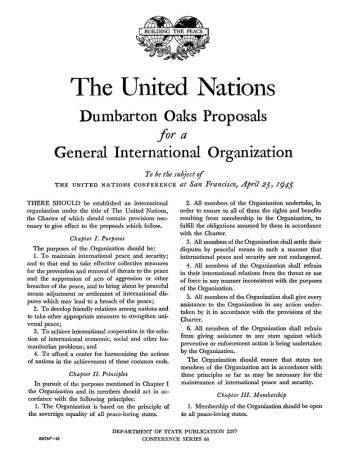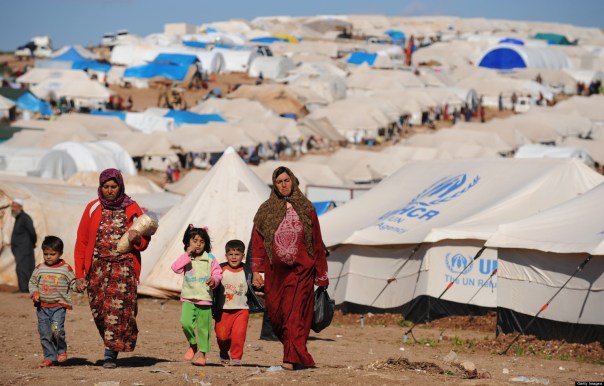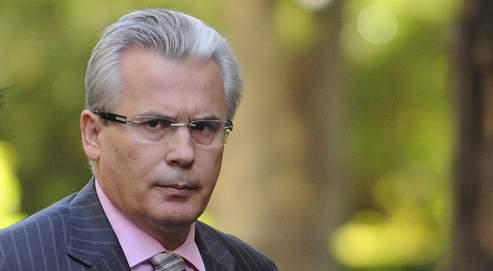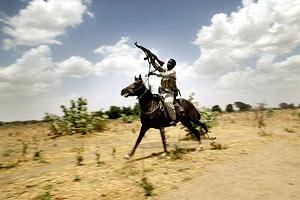JUNE 26: ANNIVERSARY OF THE SIGNING OF THE UN CHARTER
By René Wadlow
June 26 is the anniversary date of the signing of the Charter of the United Nations (UN) in San Francisco in 1945. While “UN Day” is usually celebrated on October 24, when the UN Charter came into force after the ratification by States and especially the needed ratification by the five permanent members of the proposed Security Council, it was June 26 that the UN Charter was presented to the world.
As a friend noted, “I prefer to celebrate the birth and not the baptism”. Thus for this June 26, we will look at two reports which outline challenges facing the emerging world society, and the role that the UN should play.
Dumbarton Oaks: A New Beginning – With Old Recipes
The UN Charter was largely written by a small number of persons − largely Americans and Englishmen − meeting during September 1944 at Dumbarton Oaks in Washington, DC. For readers not living in Washington, Dumbarton Oaks is a large house and estate in a then calm part of Washington where those drafting the Charter could meet quietly, leading to the little poem written at the time:
“A plan for peace, in war, evokes
Few Yeas, and perfect floods of Buts
Yet the original Dumbarton Oaks
Were also, at the start, just nuts.”
The Dumbarton Oaks proposals were largely based on the structure of the League of Nations but with a larger role of the “Great Powers” such as the “veto” power in the Security Council to guarantee USA participation and that of the USSR which had been expelled from the League. Since the presentation of the Charter in 1945, there have been criticisms and proposals for reforms and revisions. In August 1945, Milton Mayer, an active member of the Campaign for World Government and a journalist working closely with the University of Chicago-based Committee to Frame a World Constitution wrote “If San Francisco, embodying, as it does, all that is wrong with the world, not only embodying it, but sanctifying it, if San Francisco is the best we can get, are we so old, and sad and hopeless, that we have to accept it as the best we can get?”
In response to criticisms, the UN Charter provided that a Review conference on the Charter would be put on the Agenda 10 years after the Charter’s coming into force − that is in 1955. With the end of the Korean War in 1953, there began an intense discussion of UN Charter revision during 1954 and the first half of 1955. In practice, neither the US nor the Soviet Union wanted a discussion of the Charter so the issue was “swept under the rug” in exchange for a USA-USSR agreement to allow a number of States whose entry to UN membership had been blocked by Cold War rivalries to gain membership. However, the issue of Charter revision was still a hot topic in 1955-1956.
Let the Voice of NGOs Be Heard At Last
My first efforts as a Nongovernmental Organization (NGO) representative at the UN were in 1955, when there was a tenth anniversary session in San Francisco. Many of the 1945 “founding fathers” returned, some like the Soviet Foreign Minister V. Molotov still in power. We NGOs had a rich documentation of possible reforms for the UN system, thought possible as the end of the Korean War had produced a short-lived “Cold War calm”. The Fall of 1956 with the revolts in Hungary and the English-French-Israeli attack on Egypt and the Suez canal put an end to the brief “era of good feelings”, and academic research shifted from UN reform to the nature of “limited war.”
However, for the 70th anniversary this June, two useful reports have been issued: the Commission on Global Security, Justice and Governance led by Madeleine Albright, former United States (U. S.) Secretary of State and Ibrahim Gambari, former Foreign Minister of Nigeria and former UN Under-Secretary General for Political Affairs, issued their report Confronting the Crisis of Global Governance (1) At the same time, the UN-created High-Level Independent Panel on Peace Operations, led by Jose Ramos Horta, former President of Timor-Leste, issued its recommendations stressing that “Primacy of politics means that lasting peace is achieved through political solutions and not through military and technical engagements alone. Political solutions must guide all UN peace operations.”
Both reports are worth reading as a reflection of current thinking. Personally, I was glad to find no new ideas. If there had been ideas and proposals that I had not heard before, I would have had the impression of getting old and being “out of things”. Rather, what is striking in both reports is the emphasis given to the crucial role of NGOs, now usually called by the larger but less clear term of “civil society”.
Both reports highlight the trend toward greater openness to the participation of NGOs in world policy processes and in the implementation of programs. Both governments and the UN increasingly recognize the importance of having more diverse voices at the table and especially “on the ground”. The Commission on Global Security report is structured around what it sees as the three crucial challenges facing the emerging world society: State fragility, climate governance and the stewardship of the world economy. As the report states “Global governance is a mix of bilateral informal multilateral, and treaty-based relations among states increasingly influenced by non-state actors’ interests and activities.”
The report recognizes that any reforms of UN structures is difficult − basically impossible − because the system works “well enough” to suit most governments and that most governments are not willing to risk major changes in the world society because of unknown consequences. Therefore change and improvements will come only through forceful and coordinated efforts from the non-state sector. In the “non-state sector” the report places NGOs in consultative status with the UN, currently some 4,000 NGOs, the 2,000 largest business firms, most of which are active in more than one State, and the 750 largest cities which increasingly have trans-frontier impacts.
Both the Commission and the High-Level Independent Panel consulted NGOs, but the NGO views are not presented as such. For the moment, it is difficult to speak of a common NGO view, especially if we need to integrate the views of transnational corporations and city administrations. NGOs come in all shapes and sizes, and some seek UN accreditation for domestic reasons and do not really participate in UN activities. The reports set out the challenges well. The next step is to develop a broad understanding among NGOs of these challenges and of the steps which they can undertake collectively − an appropriate birthday present.
Prof. René Wadlow is President and Chief Representative to the United Nations Office at Geneva of the Association of World Citizens.







